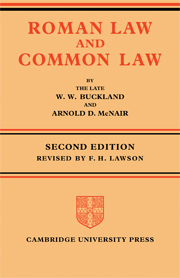Book contents
- Frontmatter
- Contents
- Preface
- Preface to the Second Edition
- Note on the 1965 Impression
- Introduction
- Abbreviations
- Chapter I THE SOURCES
- Chapter II THE LAW OF PERSONS
- Chapter III LAW OF PROPERTY
- Chapter IV LIMITED INTERESTS AND SERVITUDES
- Chapter V UNIVERSAL SUCCESSION
- Chapter VI OBLIGATIONS: GENERAL
- Chapter VII OBLIGATIONS: GENERAL (cont.)
- Chapter VIII PARTICULAR CONTRACTS
- Chapter IX QUASI-CONTRACT AND NEGOTIORUM GESTIO
- Chapter X DELICT AND TORT
- Chapter XI PARTICULAR DELICTS AND TORTS
- Chapter XII PROCEDURE
- Index
Introduction
Published online by Cambridge University Press: 30 March 2010
- Frontmatter
- Contents
- Preface
- Preface to the Second Edition
- Note on the 1965 Impression
- Introduction
- Abbreviations
- Chapter I THE SOURCES
- Chapter II THE LAW OF PERSONS
- Chapter III LAW OF PROPERTY
- Chapter IV LIMITED INTERESTS AND SERVITUDES
- Chapter V UNIVERSAL SUCCESSION
- Chapter VI OBLIGATIONS: GENERAL
- Chapter VII OBLIGATIONS: GENERAL (cont.)
- Chapter VIII PARTICULAR CONTRACTS
- Chapter IX QUASI-CONTRACT AND NEGOTIORUM GESTIO
- Chapter X DELICT AND TORT
- Chapter XI PARTICULAR DELICTS AND TORTS
- Chapter XII PROCEDURE
- Index
Summary
As stated in the Preface, the purpose of this book is a comparison of some of the leading rules and institutions of Roman law and English law. This is in no way new. Apart from earlier work, Professor Pringsheim, some years ago, dealt with the matter at Cambridge. Professor Schulz's Principles of Roman Law contains much on the topic. But these writers are mainly concerned with striking resemblances which they find. Dean Roscoe Pound, however, in his brilliant Spirit of the Common Law, is concerned to point out differences between the Roman conceptions and ours. In fact, however, his comparison is in the main not between the common law and the law of the Romans but between the common law and the law of the Civilians. The central notion of the developed Romanist system, he says, is to secure and effectuate the will. The Romanist thinks in terms of willed transactions, the common lawyer in terms of legal relations. But this ‘Willenstheorie’ is not Roman. It was developed by the nineteenth-century Pandectists, under the influence of Kant, who makes it clear that he is not dealing with any actual system of law. For the view that the Romanist thinks in terms of willed transactions rather than of relations Dean Pound gives terminological evidence, but it would not be difficult to find evidence of the same character for the contrary proposition.
- Type
- Chapter
- Information
- Roman Law and Common LawA Comparison in Outline, pp. xv - xxiiPublisher: Cambridge University PressPrint publication year: 1952



